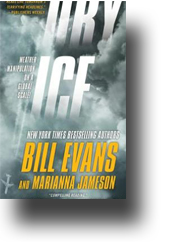

all website content © Marianna Jameson ~ all website design © Paula Roe
reprinting any part of this website without prior permission is strictly prohibited.


Tess Beauchamp struggled to keep a pleasant expression on her face as she listened to her ostensibly worthy opponent spout war-mongering drivel.
Sitting under hot lights in an otherwise darkened auditorium wasn't the way she would have chosen to spend a gorgeous late afternoon in early spring on the quaint Mediterranean island of Malta, but she didn't have much choice in the matter. It was the last day of the invitation-only biannual NATO conference on advances in military weaponry. Tess was the main attraction for the conference's final and much-anticipated presentation: a face-off between two of the leading experts in the field of ionospheric manipulation. The topic was the latest advances in the use of weather as a weapon.
Tess and her opponent sat in comfortable chairs several feet apart from each other on the stage, separated by an Oriental rug and a pair of small tables bearing live plants and sweating carafes of iced water. The moderator of the debate sat center stage, looking as neutral and bobble-headed as a line judge at a tennis match.
While the chairs might have been comfortable, Tess was not and tried to subtly shift her position yet again, cursing whatever mental demon had possessed her to wear a skirt to this dog-and-pony show. Especially a skirt that came to a halt well above her knees.
The common-sense demon that assumed I'd be standing behind a lectern when facing a room full of men wearing brass baubles and campaign ribbons, not sitting with my ass at their eye level.
The organizer of the event, a charming, if slightly doddery elder of the weather-science community, had told her right before she went onstage that her opponent, a short, wiry, generally snide Austrian, had refused to stand next to her, insisting that they both be seated. Tess didn't need to be told the reason. She was six-foot-one in her bare feet, and Herr Twerp was a mere five-foot-four. He could make Nicolas Sarkozy feel tall.
So here she was, with her ass paralyzed from sitting in one position too long and with no hope of relief unless she wanted to give an auditorium full of NATO generals a crotch shot they'd never forget.
The worst part was that she was sorely tempted to do it.
"Dr. Beauchamp? Your final comment, please. One minute."
She nodded to the moderator, then made eye contact with Napoléon Lite. "If you'll allow me to be candid-" Tess ignored the smattering of laughter from the audience. "I don't take issue with your position because I'm a peacenik, as you so charmingly called me. I take issue with your position because it's based on a convoluted premise. You talk about the benefits of using weather as an offensive weapon, but if we use weather as a deterrent to conflict instead of as a weapon, the world at large will be better off.
"Poverty, as we've already discussed, is frequently a significant factor in the escalation of regional and even international conflict, and can be a clear precursor to declared war. And let's face it: wars aren't generally started over politics. That's just the hair spray and high heels. Wars are begun over borders, land, or natural resources; take one government in the mood to acquire, add a population made restive by basic needs not being met, throw in a natural disaster or two, or a few months of sub-optimal weather, and you have a classic recipe for war."
Tess paused, gracefully pushing a long lock of blond hair behind one ear, and smiled at the man opposite her on the stage before continuing. "By regulating the weather for peaceful purposes in countries on the brink of an escalation of conflict, by operating in concert with ongoing humanitarian efforts, poverty could be radically diminished, which means wars could be averted. This approach does not have to be limited to places that are already in trouble. We have the technology to effect real change, positive change. And it can be applied everywhere. Anywhere," she said, leaning forward in her seat and only just refraining from pointing an accusing finger at him.
"Populations that are prosperous and happy have little incentive to disrupt their lives and civic structure and decimate their populations to support the high risks and no to low rewards associated with turning their surroundings into a war zone. To the contrary, prosperous societies are highly motivated to maintain the status quo. For the sake of a sound bite, I call my approach 'mutually assured prosperity,'" she finished as she saw the small red light blink on. She leaned back in her seat and folded her hands in her lap.
The moderator turned to allow Tess's opponent the last word. The little Austrian was already shaking his head vigorously. "I fear you are naïve, Dr. Beauchamp, and I know you are deliberately skewing my position. I am not speaking of war, I am speaking of technology. It is indisputable that we have the technology. It should be used," he said in his heavily accented voice, his finger stabbing the air for emphasis. "Call its use 'preemptive' or 'proactive' or 'offensive'. The words matter little. What matters is that the atmosphere, the weather, should be used as both a strategic and a tactical weapon to guard against rogue elements achieving any sort of critical mass in conflicts.
"We have seen, in Afghanistan and Pakistan, in Madrid and London and your own New York City, what these well-funded miscreants can do if left unchecked." He shrugged impatiently. "I agree that poverty can be used effectively to start wars, certainly. But it can be used to end them, too, because the hand that feeds a starving, war-weary population will be the hand of the victor."
You can't be serious. Bomb them, starve them, then save them? Tess bit her lip to keep from saying it out loud.
"And so I say," he continued, stabbing the air again with a stubby index finger, "that weather must be used strategically in terms of keeping enemies off balance. Even in happy, prosperous nations, there is always a segment of the population that gets greedy while the rest remain content, or at least complacent. As a tactical measure, using weather events - disruptions - to keep the populations focused on domestic concerns is critical. Droughts, flooding, cyclonic storms - they will keep governments' and populations' minds and money away from troublesome external issues they can't afford to support."
Like economic growth? You nasty little worm.
"And we will have to leave it there. Thank you both," the moderator interjected smoothly, and led the audience in a round of polite applause.
Tess turned off her microphone and unclipped it from the lapel of her suit jacket, then pushed herself to her feet as gracefully as she could, hiding a grimace as blood rushed painfully into her numb feet. She crossed the short distance between them and shook her opponent's hand with an outward show of professionalism, while secretly delighting in the small barrage of flashes from the approved press pool gathered at the foot of the stage. It was neither coincidence nor fashion sense that had driven her to wear three-inch heels today; it had been pure deviltry.
Forge Books ~ July 2011








